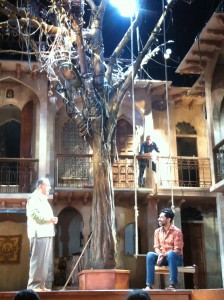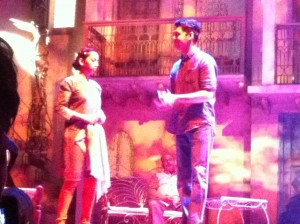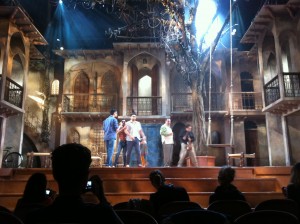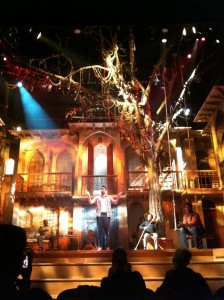Update, October 2017: due to a five year agreement between the RSC and Equity expiring, I have had to remove the video of the Q&A session.
For a while now, I have had a half-baked ambition to see all of Shakespeare’s plays performed live on stage; the medium they were created for. This is not some kind of challenge to be rushed through, but something to be enjoyed and appreciated at my leisure. I saw the Royal Shakespeare Company’s production of Julius Caesar in August 2012 and documented that here on my website. The RSC’s London season continued at the Nöel Coward Theatre with Much Ado About Nothing, again transferring from Stratford. I was reading about the play and discovered a page on the website advertising what the RSC described as a “social media call”. It’s been two years since I graduated with a degree in Broadcast Journalism, and I haven’t worked in the industry since. I thought attending might be a good way to combine these two ideas, as friends and colleagues often ask why they haven’t yet heard or seen me on BBC News, or doing anything related to my degree. Well one – it’s tough and competitive out there, as is the jobs market. Two, that’s not something I’m entirely certain I’d enjoy. I thought I would try this though, as I’ve said. I let the RSC know I was interested in attending, and they confirmed my place.
At the theatre, we were given the opportunity to watch the actors and crew rehearsing before they were ready for us. We then watched a full dress run of act two, scene three, which includes Balthasar’s song “Sigh No More”, and Benedick’s soliliquoy. We were encouraged to take photos and video during this time, which I did, although I didn’t have a camera so had to use my iPhone. Most of the photos and videos are disappointing and can’t properly capture the vibrancy of the lighting design, nor the impressive set, complete with full-size tree, but I shall include some anyway.

What I did see of the show – I was unable to attend the evening performance I was invited to – was stunning. It is so easy for Shakespeare to be used as the height of drama, with wannabe Oliviers or Kenneth Branaghs giving their best RADA-taught performances. The RSC isn’t like that, and I liked the subtlety of what I saw, despite the scene being high-energy in parts, and even including singing and dancing. It was naturalistic Shakespeare and characters not only acted but re-acted to what was happening in the scene. Every performance the audience should feel as if the lines are being spoken for the first time, thought up in the brains of those on stage, not 500-year-old sentences. This production achieved that effortlessly.

Once the scene had been performed, there was a question and answer session. The scene had taken longer than anticipated, meaning there was less time for the Q&A, and I didn’t get to ask any of my questions. Some similar ones were asked by others, however.
The actors and director Iqbal Khan were knowledgeable about what they were doing, and insightful in to the relevance of Shakespeare in 2012, following on from this year’s World Shakespeare Festival. One person attending the social media call asked the group about their experiences with “traditional Shakespeare” – making the unfortunate supposition that Shakespeare should be performed by white English actors. The late Paul Bhattacharjee, playing Benedick, was the first to respond in a video I’m no longer able to show here, but here’s a quote:
“You used the word tradition – you should be really aware of what you’re talking about, because there is a level of education in India that far exceeds our expectations… Why it’s such an easy fit is because [for example] Much Ado is a family tale. Now if there’s anything that we grow up with in India it’s great big epic family stories… I would say this is tradition”
Overall, I was very glad I had the opportunity to attend the social media call. It was only the second occasion I had been able to work with the Royal Shakespeare Company, and I am grateful for both of those times.



 A police force in England has made a splash in the social media world by tweeting every incident it dealt with over a 24 hour period from 5AM BST (midnight EST) on Thursday October 14th to the same time yesterday, Friday 15th.
A police force in England has made a splash in the social media world by tweeting every incident it dealt with over a 24 hour period from 5AM BST (midnight EST) on Thursday October 14th to the same time yesterday, Friday 15th.